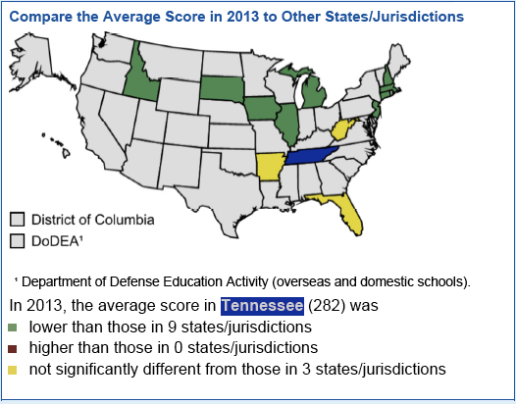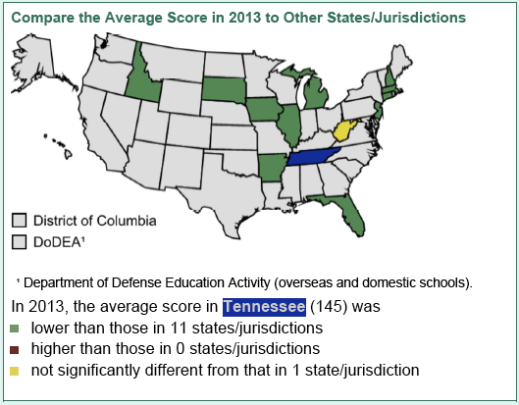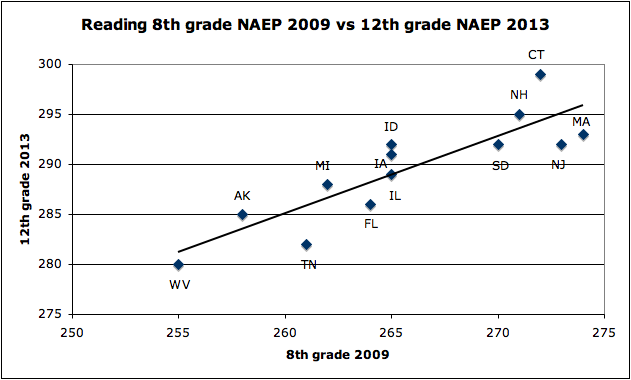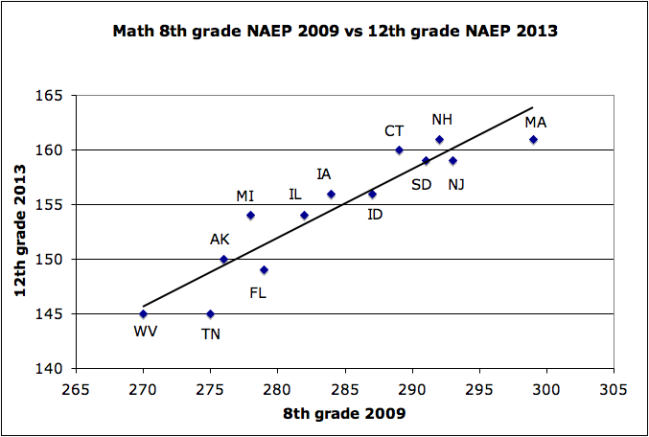Gary Rubinstein’s Blog: I Love the Smell of NAEPalm in the Morning
Tennessee has been hailed as a ‘reform success’ because of its recent 4th and 8th grade NAEP gains between 2009 and 2013. Even the President gave them a shout-out during his state of the union address a few months ago.
Five years ago, we set out to change the odds for all our kids. We worked with lenders to reform student loans, and today, more young people are earning college degrees than ever before. Race to the Top, with the help of governors from both parties, has helped states raise expectations and performance. Teachers and principals in schools from Tennessee to Washington, D.C. are making big strides in preparing students with skills for the new economy – problem solving, critical thinking, science, technology, engineering, and math. Some of this change is hard. It requires everything from more challenging curriculums and more demanding parents to better support for teachers and new ways to measure how well our kids think, not how well they can fill in a bubble on a test. But it’s worth it – and it’s working.
Tennessee was one of the first states to win Race To The Top funds. They also have a ‘Chief For Change’ Kevin Huffman as their commissioner of education — a former TFA VP and a former husband of Michelle Rhee. They have been getting a lot of mileage out of the fact that Tennessee and D.C. had NAEP ‘gains’ that were larger than the rest of the country, thus proving that the corporate style of education reform was getting results. I wrote about this when those score were released.
I don’t put a lot of stock into NAEP scores. Though they say you can’t prep for the NAEP, I think that if you have your teachers focus on just math and reading at the exclusion of other just as important subjects, your NAEP scores will rise. But although I don’t put a lot of stock into NAEP scores, the ‘reformers’ do. So it is amusing when new data comes out that causes them to look bad by their own treasured metric. This is exactly what happened today.
For all states, students in 4th and 8th grade take the NAEP every four years. In 2009 some states participated in a 12th grade NAEP and in 2013 more states participated, including Tennessee. When the results came out today, it was revealed that Tennessee 12th graders were statistically tied for last out of 13 participating states in both Reading and Math.
Reading
Math
Of course Huffman had an explanation. According the tn.chalkbeat.org
Huffman said the scores suggest that reforms are taking time to trickle up to the high school level.”The kids who left high school last year spent many years in the public school system before any of the major changes that have helped improve things went into effect,” he said. ”We’re hopeful that we’ll see scores rise in next couple years.”
Chalkbeat also reminded readers that it was ‘gains’ not absolute scores that had earned Tennessee praise and that “The high school results don’t show change over time, because 2013 was the first time that Tennessee agreed to have its 12th grade scores released publicly.”
But although it is true that in 2009 the 12th graders in Tennessee didn’t report their NAEP scores so we can’t compare this group of 12th graders to the group of 12th graders four years ago. We can do something even more meaningful. Even though the 2009 12th graders can’t provide a baseline score, the 2009 8th graders — the ones who grew up to become the 2013 12th graders — did.
So what I did was take the thirteen states who reported the 12th grade results for 2013 and made some scatter plots (love them, or hate them, but you just CAN’T be indifferent toward them). To see how the students in Tennessee truly ‘grew’ in the time that they won their Race To The Top grant.
As can be clearly seen on these graphs, Tennessee is actually lagging not just in absolute scores, where they are statistically tied for last in both categories, but also in ‘growth’ as they are decisively below the ‘trend line’ on both graphs.
Of course they will continue to say that the 12th graders didn’t get a chance to go through the complete reform program, so these don’t mean anything. But all these ‘reforms’ should have helped older kids to ‘grow’ academically over the past four years relative to the other states if there was anything authentic about them. Now I’m not the one who said that NAEP gains are everything, but if they insist on using this as their weapon of choice, they are going to have to deal with the criticism when those same weapons are used against them.
This blog post has been shared by permission from the author.
Readers wishing to comment on the content are encouraged to do so via the link to the original post.
Find the original post here:
The views expressed by the blogger are not necessarily those of NEPC.




